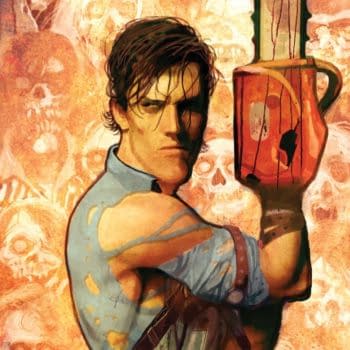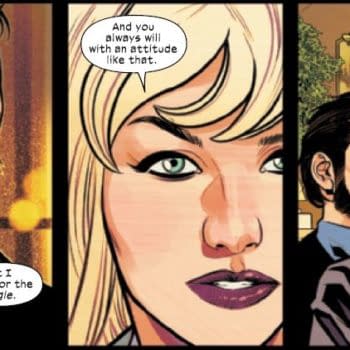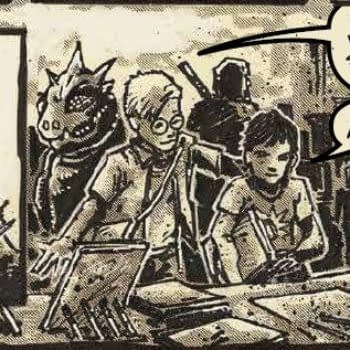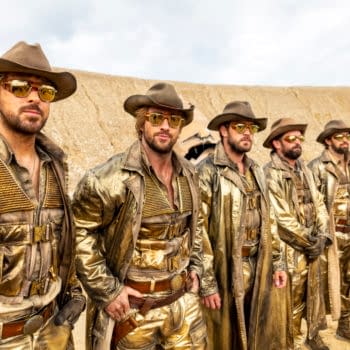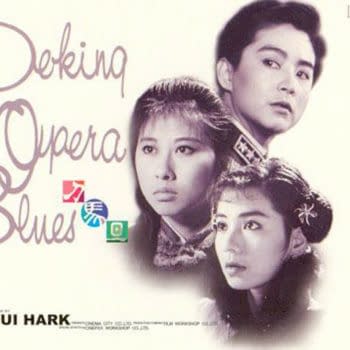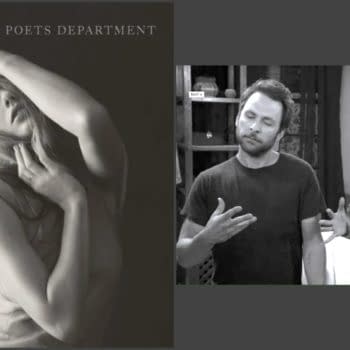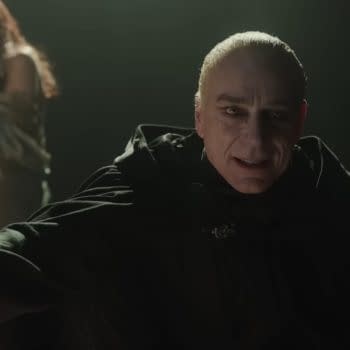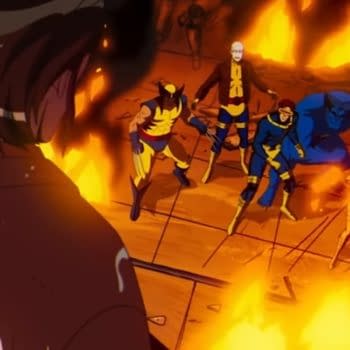Posted in: Movies, TV | Tagged:
Sherlock And British TV Drama Through A Victorian Glass Darkly – Look! It Moves! by Adi Tantimedh
Adi Tantimedh writes,
As you might have noticed, this year's single Sherlock was set in the character's original Victorian setting. Steven Moffat and Mark Gatiss had wanted to do something that felt special since Benedict Cumberbach and Martin Freeman's schedules made it impossible for them to film a whole season.
I'd been wondering about this minor trend in the last few years of revisionist period dramas set in the Victorian era, from the now-departed Ripper Street (which seemed to have been 'inspired' by Alan Moore and Eddie Campbell's From Hell, only without the metaphysical or mystical layers), the lavish adaptation of Charles Dickens' Great Expectations, Penny Dreadful (also seemingly 'inspired' by Alan Moore and Kevin O'Neill's The League of Extraordinary Gentlemen, only sticking to the Horror genre), and more recently a souped-up Jekyll and Hyde and Dickensian. There is a deep sense of nostalgia in these shows, recreating a dream of the Victorian era that never was, filtered through a knowing and modern sensibility that's more politically and socially progressive than it was ever possible for the people who actually lived then to be, addressing the racism and patriarchal sexism of the era that we now find unacceptable that was common then. Is it any wonder that Steampunk should be set in the Victorian era, the height of Empire, when the riches of commerce brought by colonialism afforded English society the rise of the Industrial Revolution and the possibilities of new scientific and technological discoveries.
To me, it feels like these newer Victorian dramas, filtered through a lens of geeky genre awareness, that nostalgia is a sign of stagnancy, of not wanting to look ahead, this retroactive constantly looking back. With things in the UK looking increasingly dire with Tory policy cutbacks, social discontent, economic decline and ecological chaos as climate change brings about unprecedented flooding that may change the British Isles forever, it's as if British pop culture wants to escape the horrors of the present and can't yet bring itself to look to the future, so it filters the present through the nostalgia of the Victoria past. Ripper Street drew parallels between the past and present socio-political issues. Penny Dreadful had a Literature Major's relish for examining the roots of the Horror genre and its capacity for dramatizing ideas about Gender and Otherness. Jekyll and Hyde revises the original into a geek's superhero fantasy. Dickensian eschews Charles Dickens' social conscience and activism to concentrate on fan fiction to create a League of Extraordinary Gentlemen-style unified "Dickens-verse".
Even Downton Abbey does this, nostalgic for a conservative fantasy in the time between the Wars where the upper and lower classes knew their place. It's either this or crime drama that constantly, mawkishly wrings its hands at how awful people can get.
Which brings us to this year's Sherlock.
At first it seems like the cleverest, most self-conscious exercise in metafictional nostalgia out of them all, like the culmination of all these recent postmodernist takes on the Victorian-set TV drama. It's fully aware of being a fantasy, a simulacra of Sherlock Victoriana, commenting on the original stories, even commenting on the unequal gender politics not only of the time but of the stories written in that time as well in a way that only a 21st Century perspective can bring. Like Penny Dreadful, it relishes deconstructing the artifice of genre, picking apart Gothic, Detective Fiction and the Victorian Ghost Story as Holmes and Watson become increasingly aware that they are in a story, a story within a story within a dream of postmodernist literary dissection. Holmes and Watson are conscious and self-conscious about playing the roles the stories have prescribed to them even as neglected characters like Mrs. Hudson chafe at their lack of nuance or agency in the stories written.
This seems to be the year Moffat discovered Feminism, in an unsurprisingly male and clumsy way, responding to charges of sexism in his writing by correcting his previous lapses in Doctor Who and now Sherlock where he offers a corrective for the misogyny visited upon women in not just Victorian England but also the popular fiction… fiction like the Sherlock Holmes stories. And without giving too much away, the metafiction of this episode of Sherlock also has thematic and stylistic parallels with the Doctor Who episode Heaven Sent where The Doctor was trapped in a place that's as much his personal mental purgatory as a physical space and forced to with his limitations and sheer bloody-mindedness.
Sherlock the series this year was in a holding pattern because of the schedules and availability of its stars, and the show itself feels like it's in a cultural holding pattern like the rest of British TV, unable to look forward to the future but finding solace in the past. The latter practise is actually a profitable one, since British period dramas sell very well to TV internationally. Period dramas are one of the imports that the world is eager to buy, one of the few natural resources that the UK has left, now that Empire is over. Period drama actually sells and continues to assert Britain's place on the world cultural stage even as the government continues to search for political relevance on the world stage. British Nostalgia sells, and it was Sherlock's turn. Hopefully Sherlock and the rest of British TV drama can start moving forward in time again.
Don't look back in anger at lookitmoves@gmail.com
Follow the official LOOK! IT MOVES! twitter feed at http://twitter.com/lookitmoves for thoughts and snark on media and pop culture, stuff for future columns and stuff I may never spend a whole column writing about.
Look! It Moves! © Adisakdi Tantimedh







